- Home
- Marcia Talley
A Quiet Death Page 2
A Quiet Death Read online
Page 2
Boyer cocked his padded arm and took a swing at the door. He cocked his arm and swung again. And again, and again. The door stood firm.
‘Sergeant! Stop! You’re going to hurt yourself,’ I yelled as Boyer hauled his arm back to take another swing.
‘Shut up, bitch!’ someone behind me snarled. ‘Who else gonna get us outta this mess!’ The potty mouth belonged to another survivor who had staggered up to join us, a twenty-something thug wearing a wife-beater tank and a pair of shredded, low-rider jeans. Earlier, he’d been sporting a ball cap worn backward and to one side, gangsta-style, but his cap had disappeared in all the confusion.
Boyer shot shrapnel out of his eyes. ‘Watch your language, asshole. You in such a hurry to get out of here, grab something and start pounding.’
I scanned the floor, looking for ammunition, and spotted a fire extinguisher next to a crumpled bulkhead, near what had once been my seat. ‘Sergeant Boyer! Use this!’ I nudged the extinguisher toward him with my bare foot. Bare foot? Where the hell were my shoes?
Boyer picked up the extinguisher, flashing me a wan grin. Holding the extinguisher like a battering ram, he hammered the base of it hard against the glass. He brought his arm back and swung again.
A small crack appeared.
‘Go, go, go!’ the man called Baby chanted, as Boyer continued hammering away on the door.
His girlfriend had abandoned her histrionics and rejoined our little group, yelling encouragement from the sidelines as the crack spread, creeping with snail-like speed up the glass. ‘You’ve got it! You’ve got it! Keep going! Keep going! You are the man!’
I found I was chanting, too – Go! Go! Go! – each time the base of the extinguisher made contact with the glass. The crack was gradually widening, expanding, spreading like a spider web.
Boyer delivered a final savage blow, and the glass popped out.
We all stood there for a moment, silent, not quite believing that we’d soon be free, leaving the devastation behind us. Still holding the extinguisher, Boyer fell back against the bulkhead, breathing heavily, trying to catch his breath. Sweat beaded on his forehead, ran down his cheeks, saturated his T-shirt, turning the underarms dark. ‘Out!’ he ordered, then slowly uncurled his hand and let the extinguisher drop to the floor.
The man called Baby helped his girlfriend through the opening, then scampered quickly after her. The foul-mouthed thug was next in line, hopping from one foot to the other, raring to go, but Boyer grabbed his arm, held him back, taking the time to lean out the opening he had created in the door and yell to Baby’s departing back, ‘For Christ’s sake, tell someone to turn off the third rail before some idiot gets electrocuted!’
Then the thug, too, slipped away to join a steady stream of walking wounded, limping along the tracks outside, dragging their possessions behind them like zombies in a B-movie.
Boyer offered me his hand. ‘Time to go.’
‘Is that all of us?’ I choked. ‘Only five?’
Boyer sucked in his lips, looking grim. ‘I think we have to leave it to the paramedics now.’
I had started toward the opening in the door when somebody called out, ‘Hello? Can anybody hear me?’
Even though I’d had only a brief conversation with him, I recognized the voice: the guy who had been sitting next to me nursing the Garfinkel’s bag.
‘Did you hear that, Sergeant?’ Cradling my injured arm, grinding my teeth against the pain, I inched toward the front of the car and began a surreal climb through an alien landscape strewn with familiar objects, distorted, like in a Halloween funhouse mirror. ‘I’m here. Where are you?’
‘I don’t know.’
‘Talk to me!’ I yelled.
‘My legs are trapped.’
Thankfully, Sergeant Boyer had followed me forward and was standing just three feet away. ‘Sergeant! Can you get some help? Quickly! There’s someone still alive up there! I’ll see if I can find him.’
‘Keep talking,’ I called out to my former seat-mate as Sergeant Boyer hurried off to do as I asked. Feeling increasingly desperate, I scanned the wreckage. And then I saw him: a head of curly hair, a shoulder and one arm. But his body from the chest down had disappeared. It took me a moment to figure out what had happened. As the floors heaved up, the seats had folded down, trapping his body in their cruel jaws.
With my good arm, I reached out to see if I could shift one of the seats holding the man captive, then thought better of it. He could have a spinal injury. If so, I would only make a bad situation worse.
‘I’m coming,’ I called out as I scrabbled over shifting debris – shattered glass, scraps of advertising posters, the Life section of USA Today, a dusty Kindle, shoes. His Garfinkel’s bag was in the way, so I moved it aside, sat down in the aisle, or what was left of it, so that I could look directly into his face, pale and etched with pain.
‘Hold on,’ I told him. ‘Help is on the way. One of the passengers just busted through the door.’
His eyes were white with panic. ‘Don’t leave me.’
‘I won’t.’
‘Are those sirens?’
‘Yes. Help is coming.’
He closed his eyes. ‘I’m dying,’ he whispered.
‘No, you’re not. My name’s Hannah. What’s yours?’
‘They call me Skip.’
‘What’s your last name, Skip?’
He moaned. ‘Sweet Jesus, I can’t feel my legs.’
‘You’re gonna be OK, Skip. Keep talking to me.’
Skip’s eyes rolled back, his head lolled.
‘Skip?’
His head jerked up, he whimpered in pain. Then his eyes found mine, locked. ‘I’ve done a terrible thing.’
‘You have?’
A gurgling cough. ‘I think I killed somebody.’
I caught my breath, tried not to gasp. I wasn’t trained in deathbed confessions, and wasn’t sure I wanted to take on the responsibility for the disposition of this man’s soul when it showed up in the afterlife. I glanced around the car, looking for support, but the sergeant hadn’t returned. For all I knew, Skip and I were the only two people left alive in the car.
‘Do you want to tell me about it?’ I asked quietly.
‘Are you Catholic?’ His voice trembled.
‘No, but I’m Episcopalian. That’s a Catholic of sorts.’
‘Rosary,’ he sighed. ‘My pants pocket.’
I couldn’t even see Skip’s legs, so there was no way I could retrieve a rosary from his pants pocket. I broke this news to him as gently as I could. ‘But I’ll be happy to recite the rosary with you.’
‘In the name of the Father, and of the Son, and of the Holy Spirit, Amen,’ he began, crossing himself.
Skip’s voice remained strong through the Creed and the first Our Father, but by the time we got to the Hail Marys, it began to tremble, then falter. ‘Hail Mary full of grace,’ he began, his voice barely audible.
‘The Lord is with thee,’ I continued, inclining my head towards his and taking his hand. ‘Blessed are thou amongst women, and blessed is the fruit of thy womb, Jesus.’
‘Holy Mary . . .’ A shuddering sigh, then silence.
‘Mother of God,’ I prompted, but Skip’s lips were no longer moving along with mine. ‘Mother of God. Skip? Stay with me, Skip!’ I eased my hand up to his wrist, wrapped my fingers around it and felt for a pulse. It was there, slow and weak. ‘Holy Mary, Mother of God, pray for us sinners now and at the hour of our death,’ I rushed on, then began the cycle again.
With the dying, I had read somewhere, hearing may be the last of the senses to go. Now and at the hour of our death. I hoped Skip heard and that the words would be a comfort to him.
‘Skip?’ I asked after a while. ‘Are you curious about how I can recite the rosary, not being Catholic?’ His hand was still warm, thank God, but his fingernails looked pale, bluish. ‘My dad was in the navy,’ I rattled on while gently stroking his hand, desperate to restore circulation. ‘When I was
in the third grade, we were stationed in Norfolk, Virginia, and my best friend was a girl from New Orleans. I sometimes went to mass with her family.’
The tension had drained from his face. He looked relaxed, completely at peace. Was Skip sleeping, in a coma, or had he died? I shivered and tore my eyes away. Outside the window, police cars, fire trucks and ambulances were lining up, lights flashing red and orange and blue. While a bone-thin stray watched warily from a patch of weeds, a cutter like a Transformer toy began to chew through the chain-link fence that bordered the tracks.
It seemed like hours before our first rescuer appeared, climbing through the makeshift window that Sergeant Boyer had created. He wore blue coveralls, a fluorescent green reflective vest, and a yellow helmet. Another firefighter followed. Then another. ‘Let’s get to it!’ one of them yelled.
‘They’re here now,’ I told Skip, squeezing his hand reassuringly. ‘Hang on.’
To the firefighters, I mouthed, ‘Hurry!’ then moved out of their way as quickly as I could so they could get to work. I slumped, relieved but exhausted, against a crumpled wall, totally defeated by the oppressive heat.
While I tried to remain invisible, two firefighters concentrated on freeing Skip, using prying tools and hacksaws to saw through the twisted metal that imprisoned him. Before long, they were joined by rescuers from other companies, some wearing brown pants held up by suspenders, and jackets with reflective stripes. The men swarmed over the car, calling out, prying up seats to look for victims.
‘Are you hurt?’
I opened my eyes. The firefighter asking the question had ‘DCF & EMSD’ scrawled across the entire expanse of his black work shirt. You need a bigger shirt or a shorter name, I thought to myself, feeling giddy.
I held out my arm, winced. ‘It’s throbbing like a son of a gun.’
‘That’s a broken arm,’ he said, after a brief examination.
‘I sorta thought so.’
‘How many people were on the train with you, do you remember?’
‘Four people already got out,’ I told him. I rubbed a hand over my eyes. Oh, God, who was missing? ‘There was a couple in front, looking at a map,’ I continued. ‘A kid listening to a Nano. A woman in a floppy hat. Maybe three or four others.’
He patted my hand. ‘Thanks. Now stay put. I’m going to get a splint for your arm. I’ll be right back.’
I was light-headed, exhausted. I leaned sideways against what remained of a seat cushion and closed my eyes. I found my mind drifting, floating, rising above the heat and the pain, until something wet and warm began sliding down my cheek. I wiped it away, then, curious, opened my eyes and examined my hand.
Blood!
My heart flopped, quivered, then flopped again. I glanced in confusion from my hand down to my chest. A circle of blood was slowly spreading across the front of my dress. I reached up and touched my head, running my fingers through my hair, feeling for the wound. ‘Oh, God, I’m bleeding, but I don’t know from where.’ I took one unsteady breath, then another. My head swam. I bit my lower lip, hard, trying to hold on to reality. The last thing I wanted to do was pass out.
In with the good air, Hannah, out with the bad. In with the good . . .
Feeling helpless, I stared at the blood on my hand as even more blood trickled warmly down my neck.
‘I’m bleeding,’ I called out to one of the firefighters. ‘Can you help?’
Suddenly, two firefighters loomed over me, superheroes in hardhats and suspenders. ‘I think she’s shocking!’ one of them said. He peeled off his gloves and kneeled in front of me, taking my chin firmly in his hands, his eyes boring into mine. With his other hand, he smoothed back my hair. ‘Don’t move!’
‘I’m bleeding,’ I sobbed, ‘and I don’t know where it’s coming from.’
The firefighter’s eyes drifted from mine to the roof of the ruined car. Following his lead, I looked up, too, to a ragged gash where the ceiling had been sheared back, as if a giant can opener had peeled it open. ‘It’s not yours, ma’am,’ the firefighter said.
Staying awake suddenly seemed too hard. Everything was closing in – screaming sirens, bullhorn blaring, the shouts of rescuers as they pulled and sawed and pried. Nothing this man was saying made any sense.
Blue sky . . . and . . . and . . . somebody was lying on the roof of the car. Through the jagged opening, a pair of white ear buds dangled, and as I watched in growing horror, a rivulet of blood began a slow descent down the thin, white cord, collected for a moment on the earpiece, then dripped warmly into my hair.
Darkness came roaring down a long, narrow tunnel, and I welcomed it in.
THREE
I awoke to singing.
Sometimes I feel like a motherless child . . .
I squinted into the glare of a powerful light that seemed to be floating in front of my face like a disembodied eye. I raised a hand to shield my eyes, but was brought up short by an IV that snaked into my wrist.
‘Ouch!’
‘Lie still now, sweetheart.’
I tried to turn my head in the direction of the voice, but something was preventing it. I could hear water running. Seconds later, a nurse’s aide appeared at my side, holding a washcloth which she used to wipe off my face and forehead, gently and methodically, as if I were a small, muddy child. She wore lavender scrubs with cartoon cats printed on them. A laminated photo ID tag was clipped to her pocket.
‘You look better than your picture, Andrea,’ I told the aide, whose long, apricot-colored hair was swept up in a twist held in place by a tortoiseshell claw.
‘Surprised they leave me alone with patients, a mug shot like that!’ She worked the cloth around the creases of my nose, laid it for a moment – warm, wet and soothing – over each eyelid. ‘That feels wonderful,’ I told her.
‘We’re just cleaning you up a bit, sweetheart, so the doctor can get a good look at you.’ Her smile dazzled, even in a room she shared with a 1000-watt light bulb.
‘What’s your name, sweetheart?’
‘Hannah, Hannah Ives. Why can’t I move my head?’
‘It’s in a brace.’ Andrea left for a moment, presumably to rinse out the washcloth, because I heard water running again. ‘Not to worry, sweetheart. It’s just a precaution.’
‘My arm’s broken,’ I told her when she came back with a freshly dampened cloth. ‘I’m pretty sure about that.’
‘Does it hurt badly?’
‘Only if I . . .’ I shifted my arm experimentally and the pain travelled up my arm in a white-hot flash, searing into my brain. Somebody had taped my forearm into a metal splint padded with cotton in order to immobilize it, but clearly the temporary measure wasn’t working that well.
Andrea laid a comforting hand on my shoulder. ‘Don’t do that, sweetheart. Just lie still. When the doctor comes, he’ll give you something for the pain. Just hold on.’
‘Do you know what day it is?’ she asked conversationally as she washed dried blood off my good hand.
I had to think. It seemed like a week had passed since the fund-raising luncheon, but it had probably been only a couple of hours. ‘It’s Tuesday,’ I said.
‘Do you know where you are?’
‘Actually, I don’t. In a hospital, of course, but I don’t know which one.’
‘Prince George’s Hospital Center. You’ve been in a train crash.’
A cold fist of fear square in the solar plexus. A wave of images: panicked survivors, frantic rescuers, the injured, the dead. Blood everywhere.
Somebody else’s blood.
‘There was a guy on the train with me,’ I shivered. ‘Named Skip. Is he here?’
‘Sweetheart, they’ve carried victims of that crash to ERs all over the metropolitan area. Here, Med-Star, Shock Trauma in Baltimore. Was your friend hurt bad?’
I tried to nod, but the straps under my chin prevented it. ‘He was trapped under some seats. It didn’t look good, I’m afraid.’
Andrea had finished with the washcloth
. She stood next to the examination table, holding the stained cloth in one hand, her other hand still resting on my shoulder. ‘We’re a regional trauma center, so he could have been brought here. Tell you what. I’ll look around. See what I can find out.’
‘Thank you.’ I shifted on the examination table and regretted it immediately. A lightning strike might have been less painful. I winced, blew air out through my lips twice, three times.
‘They’re going to be taking you for a CAT scan soon. In the meantime, let me see if I can get you something for the pain.’
‘Bless you. Then maybe I’ll have the strength to reach into my pocket and get out my cell phone.’
She patted my knee. ‘Sweetheart, there aren’t any pockets in that dress you’ve got on.’
Designer dresses, designer handbags, designer shoes. Well-kept women nattering over curried chicken salad and lemon-lime sorbet about escalating private school tuitions and how hard it is to keep good help. It seemed like a century ago in another world, maybe even on another planet.
And none of those women had been wearing . . . somebody else’s blood.
Hot tears began to roll sideways down my cheeks and into my ears.
‘I need my cell phone,’ I sobbed. ‘I have to call my husband. He’ll be worried.’
‘You had a shoulder bag when you came in. Would the phone be in there?’
‘It’s . . .’ I began, and then I remembered. I’d been texting a reply to Emily when the train crashed. My iPhone had gone flying. ‘Never mind,’ I quickly added. ‘I was holding it when . . . I’m afraid it’s still on the train.’
Even though we shared a tiny room, Andrea suddenly disappeared from view. ‘Now don’t go telling anybody,’ she said when she popped back into my line of sight, ‘because you aren’t allowed to use cell phones in here, but . . .’ She flipped open her phone. ‘What’s your husband’s number?’
I gave her our home phone number and she punched it in. She listened for a long while, then said, ‘Dang! Voicemail.’

 Unbreathed Memories
Unbreathed Memories Tangled Roots
Tangled Roots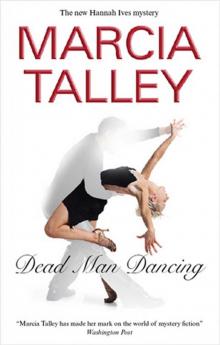 Dead Man Dancing
Dead Man Dancing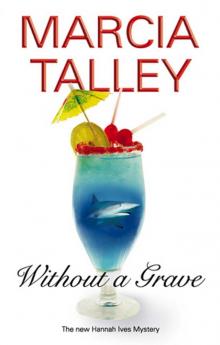 Without a Grave
Without a Grave Sing It to Her Bones
Sing It to Her Bones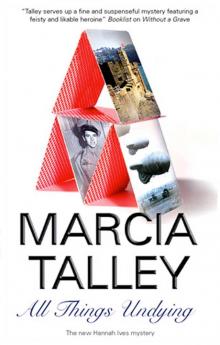 All Things Undying
All Things Undying Naked Came the Phoenix
Naked Came the Phoenix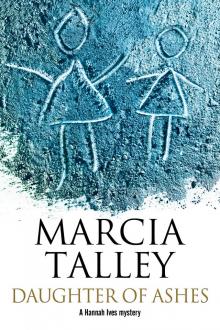 Daughter of Ashes
Daughter of Ashes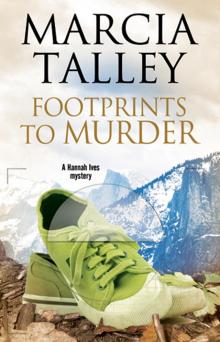 Footprints to Murder
Footprints to Murder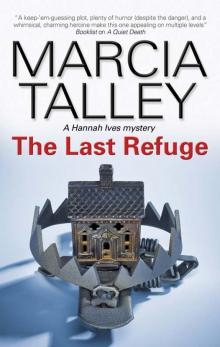 The Last Refuge
The Last Refuge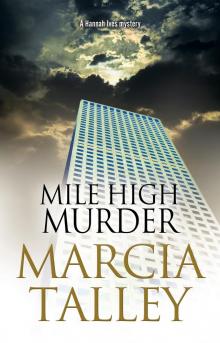 Mile High Murder
Mile High Murder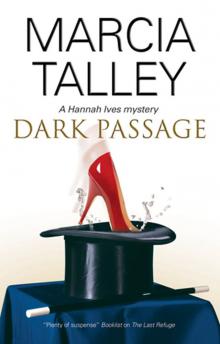 Dark Passage
Dark Passage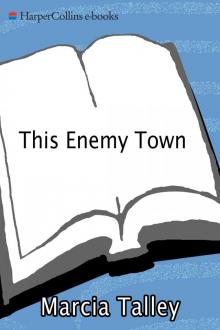 This Enemy Town
This Enemy Town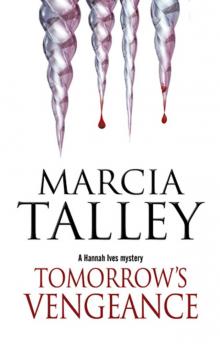 Tomorrow's Vengeance
Tomorrow's Vengeance Occasion of Revenge
Occasion of Revenge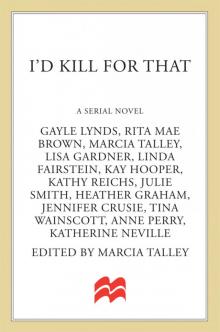 I'd Kill For That
I'd Kill For That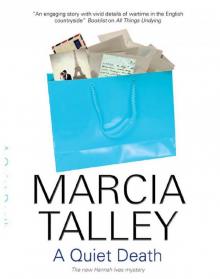 A Quiet Death
A Quiet Death